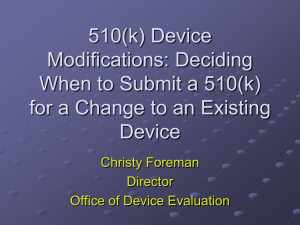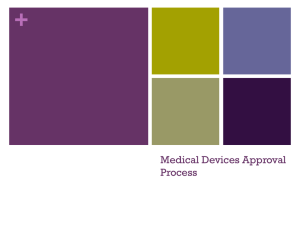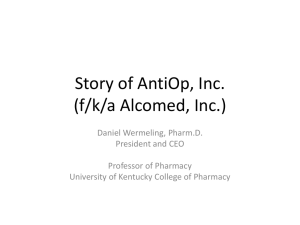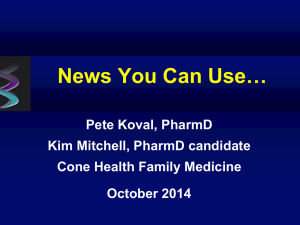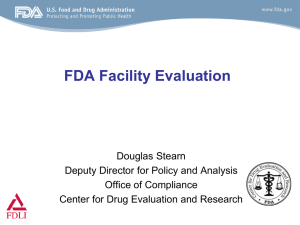FDA ODE Programs Overview
advertisement
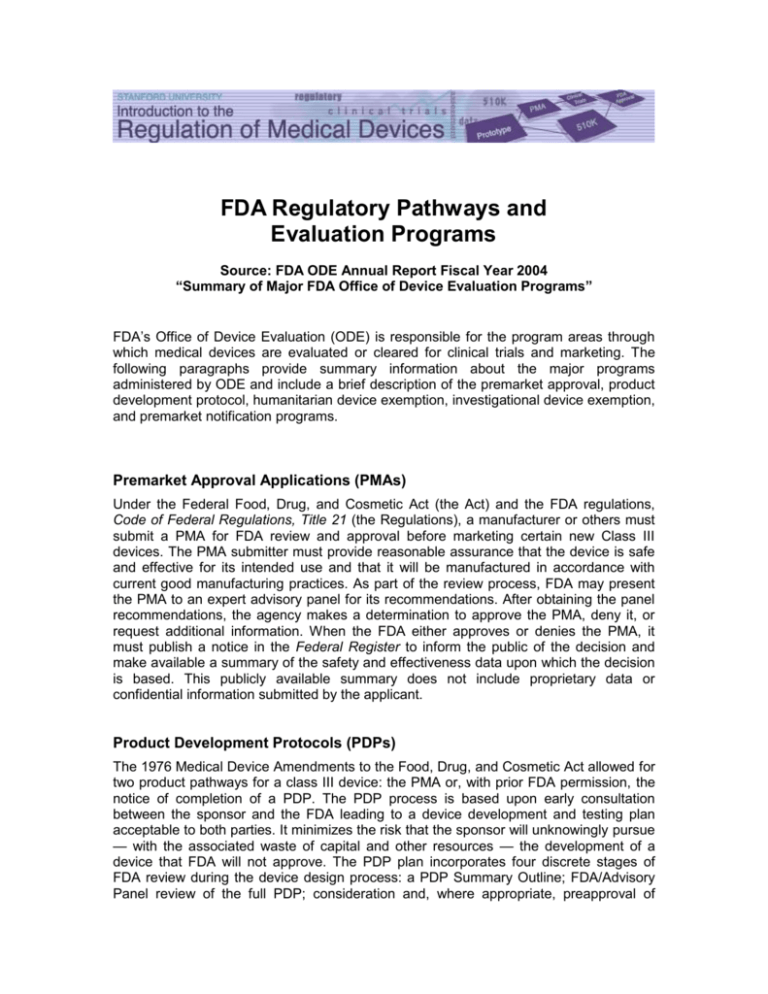
FDA Regulatory Pathways and Evaluation Programs Source: FDA ODE Annual Report Fiscal Year 2004 “Summary of Major FDA Office of Device Evaluation Programs” FDA’s Office of Device Evaluation (ODE) is responsible for the program areas through which medical devices are evaluated or cleared for clinical trials and marketing. The following paragraphs provide summary information about the major programs administered by ODE and include a brief description of the premarket approval, product development protocol, humanitarian device exemption, investigational device exemption, and premarket notification programs. Premarket Approval Applications (PMAs) Under the Federal Food, Drug, and Cosmetic Act (the Act) and the FDA regulations, Code of Federal Regulations, Title 21 (the Regulations), a manufacturer or others must submit a PMA for FDA review and approval before marketing certain new Class III devices. The PMA submitter must provide reasonable assurance that the device is safe and effective for its intended use and that it will be manufactured in accordance with current good manufacturing practices. As part of the review process, FDA may present the PMA to an expert advisory panel for its recommendations. After obtaining the panel recommendations, the agency makes a determination to approve the PMA, deny it, or request additional information. When the FDA either approves or denies the PMA, it must publish a notice in the Federal Register to inform the public of the decision and make available a summary of the safety and effectiveness data upon which the decision is based. This publicly available summary does not include proprietary data or confidential information submitted by the applicant. Product Development Protocols (PDPs) The 1976 Medical Device Amendments to the Food, Drug, and Cosmetic Act allowed for two product pathways for a class III device: the PMA or, with prior FDA permission, the notice of completion of a PDP. The PDP process is based upon early consultation between the sponsor and the FDA leading to a device development and testing plan acceptable to both parties. It minimizes the risk that the sponsor will unknowingly pursue — with the associated waste of capital and other resources — the development of a device that FDA will not approve. The PDP plan incorporates four discrete stages of FDA review during the device design process: a PDP Summary Outline; FDA/Advisory Panel review of the full PDP; consideration and, where appropriate, preapproval of design modifications and protocol revisions made during execution of the PDP; and action on the sponsors Notice of Completion. FDA review of the PDP summary may take up to 30 days; the review of the full PDP may take up to 120 days; and FDA must declare the PDP “completed” or “not completed” within ninety days of receiving the Notice. If the FDA finds that the Notice — together with other information previously submitted — shows that the requirements of the PDP, including Quality System Regulation Inspection (or GMP inspection in the case of sponsors without an established satisfactory inspection history) has been met, the Agency will declare the PDP complete. Humanitarian Device Exemptions (HDEs) An HDE application is essentially the same as a PMA in both form and content but is exempt from the effectiveness requirement of a PMA. Even though the HDE is not required to contain the results of scientifically valid clinical investigations demonstrating that the device is effective for its intended purpose, the application must contain sufficient information for FDA to determine, as required by statute, that the device does not pose an unreasonable or significant risk of illness or injury to patients and that the probable benefit to health outweighs the risk of injury or illness from its use. An HDE application must also contain information that will allow FDA to make the other determinations required by the act. An approved HDE authorizes marketing of the humanitarian use device (HUD). PMA Supplements After a PMA is approved, the PMA holder may request FDA approval of changes to be made. For example, it may request changes to the device, its labeling or packaging, or the manufacturing processes used in its production. Unless prior approval is expressly not required by the PMA regulation, changes that affect the safety or effectiveness of the device require FDA premarket approval. FDA’s review of a PMA supplement may be easy or difficult depending on the type of device, the significance of the change, and the complexity of the technology. Some PMA supplements can be as complex is the original application. Although the statutory timeframe is 180 days for PMA Supplements, FDA is committed to reviewing these in shorter timeframes and has reduced review timeframes through the use of real-time supplement process, 30-day notices, and expedited reviews. Investigational Device Exemptions (IDEs) Under the Act and Regulations, an individual, institution or company may sponsor the clinical investigation of a medical device to establish its safety and effectiveness. Before conducting a clinical trial, however, the sponsor must obtain the approval of an institutional review board (IRB) as well as informed consent from the study subjects at the time of their enrollment in the study. If the investigational device study presents a significant risk to the subjects, the sponsor must obtain FDA’s approval of an “investigational device exemption” application (IDE) under 21 CFR 812. The IDE must contain information concerning the study’s investigational plan, report of prior investigations, device manufacture, IRB actions, investigator agreements, subject informed consent form, device labeling, cost of the device, and other matters related to the study. FDA has 30 calendar days from the date of receipt of the application to approve or disapprove an IDE submission. IDE Amendments Although not provided for in the IDE regulations, all submissions related to an original IDE that has been submitted, but not approved, are referred to as “IDE amendments”. After an IDE is approved, related submissions are called “supplemental applications” under the regulations. Identification of IDE amendments enables FDA to track each IDE from the time it is originally submitted until the time it is approved. IDE Supplements The IDE regulation requires the sponsor of an investigation of a significant risk device to submit a supplemental application for a number of reasons. For example, a sponsor must submit a supplement if there is a change in the investigational plan when such a change may affect the scientific soundness of the study or the rights, safety, or welfare of the subjects. Supplemental applications also are required for the addition of investigational sites. This regulation also requires the submission of various reports, which are logged in as supplements to IDE applications. These include reports on unanticipated adverse effects of the device; recall and device disposition; failure to obtain informed consent; and annual progress reports, final reports, investigator lists, and other reports requested by FDA. Premarket Notifications (510(k)) At least 90 days before placing a medical device into commercial distribution, a person required to register must submit to FDA a premarket notification, commonly known as a “510(k).” The exception to this is if the device is exempt from the 510(k) requirements of the Act by statute or regulation. In addition to other information concerning the device, e.g., a description of the device, a 510(k) summary or a 510(k) statement, the 510(k) submitter must include information to substantiate that the device is “substantially equivalent” to a legally marketed device that is not subject to premarket approval. A substantially equivalent device is marketed subject to the same regulatory controls as the device to which it is found to be substantially equivalent. A device may not be marketed pursuant to a 510(k) until the submitter receives written clearance from FDA.


